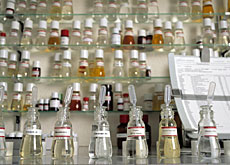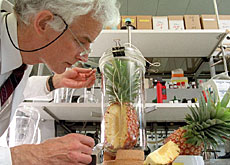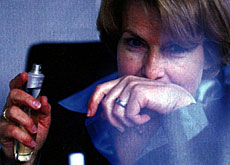Fragrances sweeten Givaudan figures

Givaudan, the world's largest maker of fragrances and flavours, saw net profit rise by 21 per cent to SFr406 million ($310.6 million) in 2005.
The result beat market expectations, which had predicted a figure closer to last year’s SFr337-million profit, and will leave shareholders with a healthy dividend.
Earnings per share increased by 27 per cent to SFr56.57 and the proposed dividend of SFr17.50 represents an eight-per-cent increase on last year’s payout.
Group sales reached SFr2.78 billion, a growth of 2.5 per cent in local currencies.
The company said in a statement that sales growth had been “impacted by the ongoing initiative to eliminate lower value ingredients”.
Geneva-based Givaudan added that if this effect had been excluded, group sales would have grown faster than the market at 3.5 per cent in local currencies.
“We are focusing on high-profit segments such as the special ingredients for fine fragrances and discarding lower-value margin ingredients,” CEO Gilles Andrier said.
Discontinued products in 2006 will depress sales by SFr25 million of flavours and by SFr20 million in fragrances.
Breakdown
Consumer products spurred growth in the fragrance division, which recorded strong gains for the fifth year in a row. Unit sales increased by 4.2 per cent in local currencies to SFr1.13 billion.
Bumper growth was also seen in the newer markets of Asia Pacific, Latin America and eastern Europe.
Givaudan expects these emerging markets to grow by nine per cent in the future.
“Our objective is to grow more than five per cent or in the high single digits in the coming years [in these markets],” Andrier said.
“As people in those regions get richer, they will buy higher-quality products… for us it means more opportunity to win additional business,” he added.
However, sales in the mature markets of North America and western Europe remained flat.
Lower prices for natural vanilla had a negative effect on sales of the flavour division.
The company, however, says it is optimistic for the year ahead.
“We are confident that in 2006 again Givaudan is well-positioned to deliver another good result, with above-average value for its shareholders and customers,” wrote Andrier in a letter to shareholders.
Givaudan also announced that it is to extend the third share buy-back programme, which was launched last year, until May 31, 2007.
The target is to repurchase ten per cent of the remaining outstanding share capital of 7,200,000 shares.
swissinfo
Léon Givaudan founded the company in 1898, but it can trace roots back to the French Revolution.
The Roche pharmaceutical company of Basel acquired Givaudan in 1963.
Givaudan was spun off from Roche in June 2000 and is now an independent company, traded on the Swiss Stock Exchange.
In 2002 the company acquired Nestlé’s flavour business FIS.

In compliance with the JTI standards
More: SWI swissinfo.ch certified by the Journalism Trust Initiative










You can find an overview of ongoing debates with our journalists here . Please join us!
If you want to start a conversation about a topic raised in this article or want to report factual errors, email us at english@swissinfo.ch.